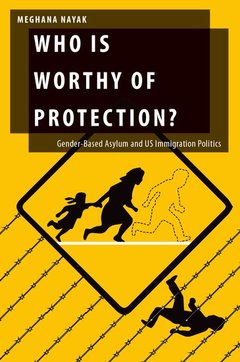Description
Who Is Worthy of Protection?
Gender-Based Asylum and U.S. Immigration Politics
Oxford Studies in Gender and International Relations Series
Author: Nayak Meghana
Language: English
Subjects for Who Is Worthy of Protection?:
Publication date: 10-2015
272 p. · 23.6x16 cm · Hardback
272 p. · 23.6x16 cm · Hardback
Description
/li>Biography
/li>
A surprisingly understudied topic in international relations is that of gender-based asylum, even though the tactic has been adopted in an increasing number of countries in the global north and west. Those adjudicating gender-based asylum cases must investicate the specific category of gender violence committed against the asylum-seeker, as well as the role of the asylum-seeker's home state in being complicit with such violence. As Nayak argues, it matters not just that but how we respond to gender violence and persecution. Feminist advocates, U.S. governmental officials, and asylum adjudicators have articulated different "frames" for different types of gender violence, promoting ideas about how to categorize violence, its causes, and who counts as its victims. These frames, in turn, may be used successfully to grant asylum to persecuted migrants; however, the frames are also very narrow and limited. This is because the U.S. must negotiate the tension between immigration restriction and human rights obligations to protect refugees from persecution. The effects of the asylum frames are two-fold. First, they leave out or distort the stories and experiences of asylum-seekers who do not "fit" the frames. Second, the frames reflect but also serve as an entry point to deepen, strengthen, and shape the U.S. position of power relative to other countries, international organizations, and immigrant communities. This book explores the politics of gender-based asylum through a comparative examination of asylum policy and cases regarding domestic violence, female circumcision, rape, trafficking, coercive sterilization/abortion, and persecution based on sexual and gender identity.
Meghana Nayak is Associate Professor of Political Science at Pace University.
© 2024 LAVOISIER S.A.S.




